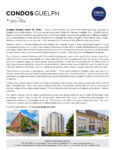
PRESS RELEASE: Condos Guelph
Guelph, Ontario (April 18, 2018) — Today, condominiums are one of the fastest-growing segments in Guelph’s real estate market. To help educate consumers about the options available, local Coldwell Banker Neumann realtor Aimée Puthon recently launched Condos Guelph (www.condosguelph.com). Billed as Guelph’s most comprehensive condo website, the mobile-friendly platform offers a wealth of information about condo-lifestyle communities across the city — plus aerial photos showcasing the different neighbourhoods.
What Ontario’s New Condo Rules Mean for Owners, Boards | Kitchener-Waterloo
“They’re going to get a lot more information about what’s going on at their condo,” says lawyer Craig Robson
by Jackie Sharkey, CBC News | July 27, 2017
A new tribunal is being established to handle disputes between condominium owners and their boards, following a CBC News investigation earlier this year that uncovered alleged corruption and conflicts of interest.
- New Ontario condo laws target boards and directors
- Is your condo board above board? Tips for evaluating condo governance
The tribunal, called the Condominium Management Regulatory Authority of Ontario, is established along with a number of new regulations that should mean improvements to how the boards are governed and provide better communication between boards and individual unit owners, lawyer Craig Robson told The Morning Edition‘s host Craig Norris on Thursday.
-
This interview has been edited for length and clarity.
Norris: What are the most significant changes that were introduced?
Robson: I think the implementation of the condo tribunal, which is an authority that’s in place to try to provide information to condo unit owners and directors and also to try to head off disputes at the pass, try to resolve disputes before they turn into major litigation and to address the fact that the cost of litigation in condominium [law] … is so excessive that it discourages legitimate litigations simply because it’s too much money.
Norris: What do these changes mean practically for condo owners?
Robson: It means they’re going to get a lot more information about what’s going on at their condo. They’ll have easier ability to call owners’ meetings if they have concerns. Their directors will have more education, they’ll be more knowledgeable. Their property managers will be licensed and I think that there’s a bigger chance for an orderly exchange of information between the condos and their boards and knowing what’s going on.
Norris: Will there be a lot of change as a result?
Robson: I think there’s going to be a lot of paperwork. There’s a lot of information circulars that have to be provided periodically. There’s a lot of disclosure that has to be made by directors. Directors now have to disclose when they’re running for office if they have any conflicts of interest. Interesting, they have to disclose if they’ve ever had a conviction under the Condominium Act — which I’ve never seen in 30 some years — but they don’t have to tell you if they’re a bank robber or not.
They’re trying to just make sure that their owners know more about their candidates.
- ‘Our little condo life in Ottawa’: Why raising kids in a small space works
- Toronto wants future condo towers to be more pet-friendly
Norris: So are these are the loopholes, as some people would describe them, that they’re trying to address with this?
Robson: I think it’s merely a matter of, in some places, it just wasn’t working right. Owners felt they were isolated. If they had a problem with the condo board, the condo could raise as much money as it needed to deal with them and homeowners would have to fight back, lawyers were required.
Hopefully the tribunal will be able to get people to sit down and work out their issues with some expertise to guide them perhaps in the right direction.
Norris: What will the tribunal do for owners?
Robson: It will give them, I think, a resource where there will be information that’s available to them. They can make contact with the tribunal and ask questions. For example, if the board is saying you can’t have a dog because the declaration says you can’t have a dog, they can phone the tribunal and say “Okay, is that enforceable? Do I have to do what I’m being asked to do by the board?” And they would be told, probably yes, you do unless it’s a service dog issue or something of that nature. Hopefully then they will feel they’ve been given impartial advice and perhaps less of a confrontation.
Norris: Who pays for this?
Robson: Some of it is government funded, initially. And then there will be an imposition of a levy on all condos of approximately a dollar a unit a month. It will be funded largely from condominium corporations collecting money from their owners and submitting them to the government.
Ontario Implementing New Protections For Condo Residents This Fall
MINISTRY OF GOVERMENT AND CONSUMER SERVICES , July 25, 2017
Ontario is moving forward to better protect condo owners and residents by increasing consumer protections in Ontario’s condo communities.
Today the Minister of Government and Consumer Services, Tracy MacCharles, announced new protections for condo communities taking effect this fall. Changes will include:
- Regular mandatory updates about the condo corporation to help improve communication between boards and owners
- Improving condo corporation governance and addressing conflicts of interest by introducing new disclosure requirements for directors, including whether they are not owners or occupiers of units in the condo or if they have interests in contracts involving the corporation
- Mandatory training for condo directors to improve how condos are managed and operated
- Clearer rules to make it easier for condo owners to access records of their condo corporation
- New notices, quorum and voting rules to make it easier for owners to participate in owners’ meetings
- Mandatory education requirements for condo managers applying for a general licence.
-
The government will also designate two new administrative authorities:
- The Condominium Authority of Ontario (CAO), when designated on September 1, 2017 will provide education and promote awareness of condo owner rights and responsibilities, as well as provide important information for condo corporations. On November 1, 2017 it will also be responsible for managing the Condominium Authority Tribunal which will resolve disputes about access to condo records. Going forward, Ontario will consult with the public to identify other disputes the Tribunal could resolve.
- The Condominium Management Regulatory Authority of Ontario (CMRAO), when designated on November 1, 2017 will regulate and license condo managers and providers.
Protecting condo residents in Ontario is part of our plan to create jobs, grow our economy and help people in their everyday lives.
Addressing the growing needs of condo communities across the province and supporting long-term sustainability of condo living is key to our government’s mandate. Creating new consumer protections will help to build more sustainable condo communities so residents moving into condos today and in the future will be able to look forward to healthy condo communities and peace of mind in the place they call home.
– Tracy MacCharles
Minister of Government and Consumer ServicesQuick Facts
- There are currently 1.6 million people living in condos in Ontario and more than 50 per cent of new homes being built in the province are condominiums.
- There are more than 750,000 condo units in Ontario, up from 270,000 units in 2001.
- The CAO and CMRAO were created as part of the implementation of the Protecting Condominium Owners Act that was passed in 2015
- The government received about 200 recommendations for condominium law reforms through its public consultation process.
New Rules For Condos in Ontario Taking Effect This Fall
THE CANADIAN PRESS , July 25, 2017
TORONTO, New protections for condo owners and rules for managers and directors in Ontario are taking effect this fall.
Government and Consumer Services Minister Tracy MacCharles says more than one in 10 people in the province live in a condo and more than half of the new homes under construction are condos.
Starting this fall, new rules will make it easier for condo owners to participate in owners’ meetings and will make it easier for them to access records of their condo corporation.
-
Directors will have to disclose whether they are owners or occupiers of units in the building or if they have interests in contracts involving the corporation, which MacCharles says will improve governance and address conflicts of interest.
Directors will also have to undergo training and there will be mandatory education requirements for condo managers applying for a general licence.
Two new administrative bodies will launch this fall _ the Condominium Authority of Ontario will provide education about condo owner rights and responsibilities and will manage the tribunal that resolves disputes about access to records, and the Condominium Management Regulatory Authority of Ontario will regulate and licence condo managers.



